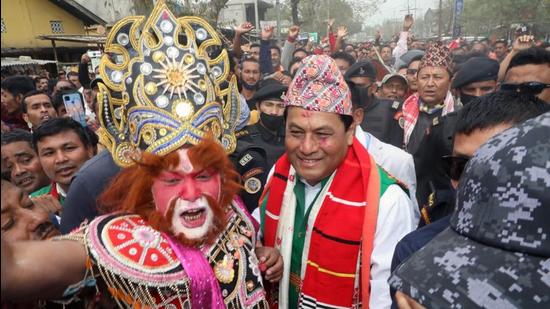No competition for Assam CM Sarbananda Sonowal in Majuli, but voters want more
It’s evening as a crowd gathers near a van with a large LED screen mounted at the back at the traffic intersection leading to Kamalabari Satra in Assam’s Majuli
It’s evening as a crowd gathers near a van with a large LED screen mounted at the back at the traffic intersection leading to Kamalabari Satra in Assam’s Majuli.

On show are video clips glorifying the state’s Chief Minister Sarbananda Sonowal and the sitting Bharatiya Janata Party legislator from the world’s largest river island who is contesting again from Majuli in this assembly polls.
The videos are accompanied by songs on Sonowal, audio clips of his speeches in the past five years and sound bites by various leaders including Prime Minister Narendra Modi praising the 59-year-old CM. Despite the short clips being played on a loop, the crowd doesn’t move, and everyone seems appreciative of Sonowal who looks set for another easy win from the constituency, which is known as the seat of Assam’s neo-Vaishnavite religion and culture spread by the 15th-16th century saint-scholar and socio-religious reformer Srimanta Sankardev.
“There’s no competition here in Majuli. Sonowal will win with a record margin and we want to see him as the chief minister for another term,” said Manoj Pegu, a college student, who was among the crowd gathered near the van. Others around him nodded in agreement.
In 2016, Sonowal, who was projected as the BJP’s chief minister candidate, got 49,602 votes (nearly 51% of the total votes) and comfortably defeated his closest rival Rajib Lochan Pegu, the sitting MLA from Congress who got 30,679 votes in the constituency reserved for scheduled tribe (ST) candidates. Sonowal, who belongs to Dibrugarh district, is facing Pegu (who had won thrice between 2001 and 2011) again this time around.
Within months of assuming charge as the head of the first BJP-led government in Assam, Sonowal declared Majuli as a district, making it the first island district in the country. Various other development works, and initiatives followed. They include construction and repair of a road network within the island and setting up a cultural university etc.
But one of the most important issues for Majuli is connectivity. In 2016, the BJP had promised construction of a bridge connecting Jorhat in upper Assam to the island. The foundation stone of the bridge was laid in February 2016 by Union minister for road transport and highways Nitin Gadkari before the assembly election. But work on the project remained in the backburner for years. Last month, Prime Minister Narendra Modi performed the ‘bhoomi-pujan’ (ground-breaking ceremony) for the 6.8 km bridge which will be constructed at a cost of ₹925 crores. Work on the project is expected to be completed by March 2025.
“It’s surprising that it took the BJP government in the Centre five years to move from foundation stone laying to ground-breaking ceremony of one bridge. No work on the bridge has started yet. People of Majuli are fed up with empty promises and they want some action,” said Bipin Dutta, a Congress supporter.
Majuli is home to nearly two dozen ‘satras’ (neo-Vaishnavite residential monasteries) and in the past five year’s Sonowal’s government has taken measures to develop their infrastructure. Annual grant to 160 ‘satras’ and ‘devalayas’ (temples) has been increased to ₹2 lakh and another sum of ₹10 lakh given to 915 religious institutions that include ‘satras’ and ‘naamghars’ (prayer houses) that are over 100 years old for their infrastructure development, mainly construction/repair of roads leading to these religious institutions
“The initiatives taken by the government are good and are going to help the ‘satras’. But care should also be taken to ensure that Majuli’s natural beauty and cultural richness don’t get affected by the large-scale construction works and entry of visitors, which has become easy due to improved connectivity. We are always concerned that Majuli will lose its unique identity,” said Hem Chandra Goswami, ‘satradhikar’ (head) of Samaguri ‘satra’.
Majuli’s culture may not be under any immediate threat, but the island continues to face the menace of erosion. From an area of 1,246 sq km in 1950, Majuli’s land mass has shrunk to around 525 sq km now due to erosion especially during floods. In the past two decades, over 3,000 families have been forced to shift away from their homes after their houses were eroded by the rising waters of Brahmaputra and its tributaries. The number of ‘satras’ have also come down from 65 to 22.
In December 2017, the Centre launched a ₹233-crore project to bring erosion under control and also to reclaim lost landmass. The scheme involved building 27 km geo-bag (filled with earth and sand) bank revetment works in 14 vulnerable areas, RCC porcupine screens at 41 locations, a 3.5 km pilot channel to drain out flood water and construction of a sluice gate at Birinibari.
There have been allegations about the quality and pace of the project. In May 2019 residents of Bhakat Chapori village complained that the geo-bags, which were to be used to protect the riverbanks from erosion, were found floating in water. The complaints forced Sonowal to visit the area and conduct an on-spot inspection. The CM agreed that the quality of the work being undertaken by Brahmaputra Board and implemented by a company based in Arunachal Pradesh was not up to the mark.
“In past years, many schemes have been announced to improve connectivity and control flood-related erosion in Majuli. While the schemes sound good on paper, we would be happy if they are implemented well and residents of the island, at least those residing in vulnerable areas are not forced to shift houses,” said Bhakat Das, a resident of Baghgaon who has shifted his residence thrice in the past decade due to erosion.





